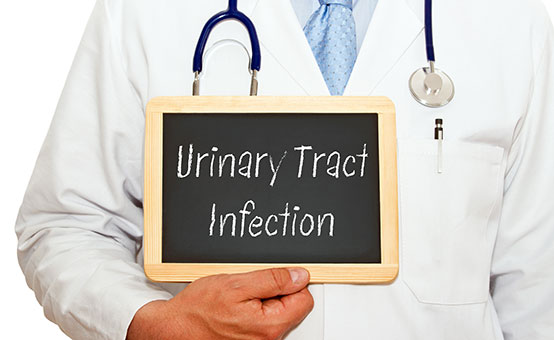

By James Chimiak, MD
TRAVEL HEALTH | Nov 18, 2019
Urinary tract infections (UTIs) can be painful and annoying; if you felt one coming on at sea, would you know what to do?
In this article, you'll find answers to the questions we get asked the most about UTIs:
The urinary tract has features designed to prevent bacterial infections, but from time to time these features may be overwhelmed. When bacteria break through our body’s natural defenses, they may take up residence in the urethra and bladder, causing the malady known as a UTI. Depending on which part of the urinary tract these bacteria invade, people may experience lower or upper UTIs. Lower UTIs affect the urethra and bladder, while upper UTIs usually affect the kidneys.
UTIs are common in adults: Approximately 3 million cases of UTI are reported each year in the U.S. alone.
Unfortunately for women, being female drastically increases the odds of getting a UTI: Women have much shorter urethras than men, meaning bacteria have less distance to travel before reaching the bladder, thus increasing the odds that infection may occur. In fact, 50%-60% of women are affected by UTIs at some point, making it the most common bacterial infection in women.
Men have a lower incidence rate of UTIs than women. For men under 50 UTIs are relatively rare but, as with women, the incidence rate for men increases after 50.
And although children have the lowest incidence rate for UTIs -- up to 8 in 100 of girls and 2 in 100 of boys will get them -- young children have a greater risk of kidney damage linked to UTI than older children or adults.
Are you experiencing pain in your pelvic area? Do you suddenly have the urge to urinate frequently, feel pain or burning when you urinate, and then feel as if your bladder is still full? You may have a UTI.
Less common UTI signs include dark-colored or blood-tinged urine. Symptoms of upper UTI may include lower back pain, cramping, nausea, vomiting, lightheadedness, and fever.
The short answer: Drink water and go see a doctor.
If you experience symptoms of a UTI at sea, respond first by drinking plenty of water. Increasing your urinary flow can slow the progression of a UTI, which is especially important if you do not have immediate access to professional medical care. Drinking water may make your symptoms less severe, but this DOES NOT mean your suspected UTI is going away; lab tests, and sometimes imaging, are required for proper definitive treatment, and a neglected UTI can become a serious health concern with potentially life-threatening complications.
If you seek treatment early, a short course of prescription antibiotics will usually knock out a UTI. However, treatment for a neglected UTI may warrant a hospital stay with IV antibiotics, and if the infection spreads to the kidneys or bloodstream, your UTI could become life-threatening or cause permanent damage.
If you have a history of recurring UTIs — or any condition that requires prescription medication — consider talking to your doctor about your options before you travel to a remote place.
Making an effort to prevent UTIs can go a long way to keeping you happy and healthy on the water, but if you get a UTI despite your efforts to prevent one, you don’t have to face it alone. As a DAN Boater member, you have 24/7 access to doctors, nurses, and EMTs who can direct you to the nearest medical care and provide guidance on treating your symptoms until you can reach that care.
While it is important to know how to identify and seek treatment for a UTI, preventing one altogether makes life on the water much more pleasant. Adequate hydration is key to preventing a lot of health problems, and UTIs are no exception. While cruising, staying hydrated can require a bit more effort, especially if you are spending lots of time in the water or out in the sun.
In addition to staying hydrated, increase your attention to personal hygiene, too. It is a good idea to wash swimsuits between wears, thoroughly rinse wetsuits, shower often, and wear clean, dry underwear (or swimsuits) as much as possible. If you’re cruising with a significant other, be sure to urinate or clean up soon after intercourse.
Traveling with an untreated or non-responsive infection is not recommended, but safe travel while taking antibiotics is possible. If you are on an antibiotic for a UTI, be aware that some may make you more sensitive to sun exposure or motion sickness, so ask your doctor about your medication or read your medication’s label and be prepared to prevent additional injury or illness. If you experience frequent UTIs talk to your doctor about your travel plans and ask them to consider prescribing antibiotics you can bring with you to take if symptoms appear. For some who suffer from chronic UTIs taking preventative antibiotics may be an option.
About James Chimiak, MD
Dr. Chimiak is the Medical Director at DAN where he oversees the organization's emergency management and medical operations. A former U.S. Navy Special Operations, Surface Warfare and Deep Sea Diver, he is also a triple board-certified physician in hyperbaric medicine, anesthesiology, and chronic pain.
MORE FROM
SAFE PASSAGE

TRAVEL HEALTH | Oct 30, 2019
Sopite Syndrome: The Insidious Side of Motion Sickness

TRAVEL HEALTH | FEB 12, 2018
How to Manage Jet Lag and Other Travel Disorders
THIS WEBSITE DOES NOT PROVIDE MEDICAL OR DENTAL ADVICE.
It is intended for general informational purposes only and does not address individual circumstances. It is not a substitute for professional medical or dental advice, diagnosis or treatment and should not be relied on to make decisions about your health. Never ignore professional medical or dental advice in seeking treatment because of something you have read on the DAN Boater website. If you think you may have a medical emergency, immediately call your doctor, dial 911, or contact emergency services nearest you.